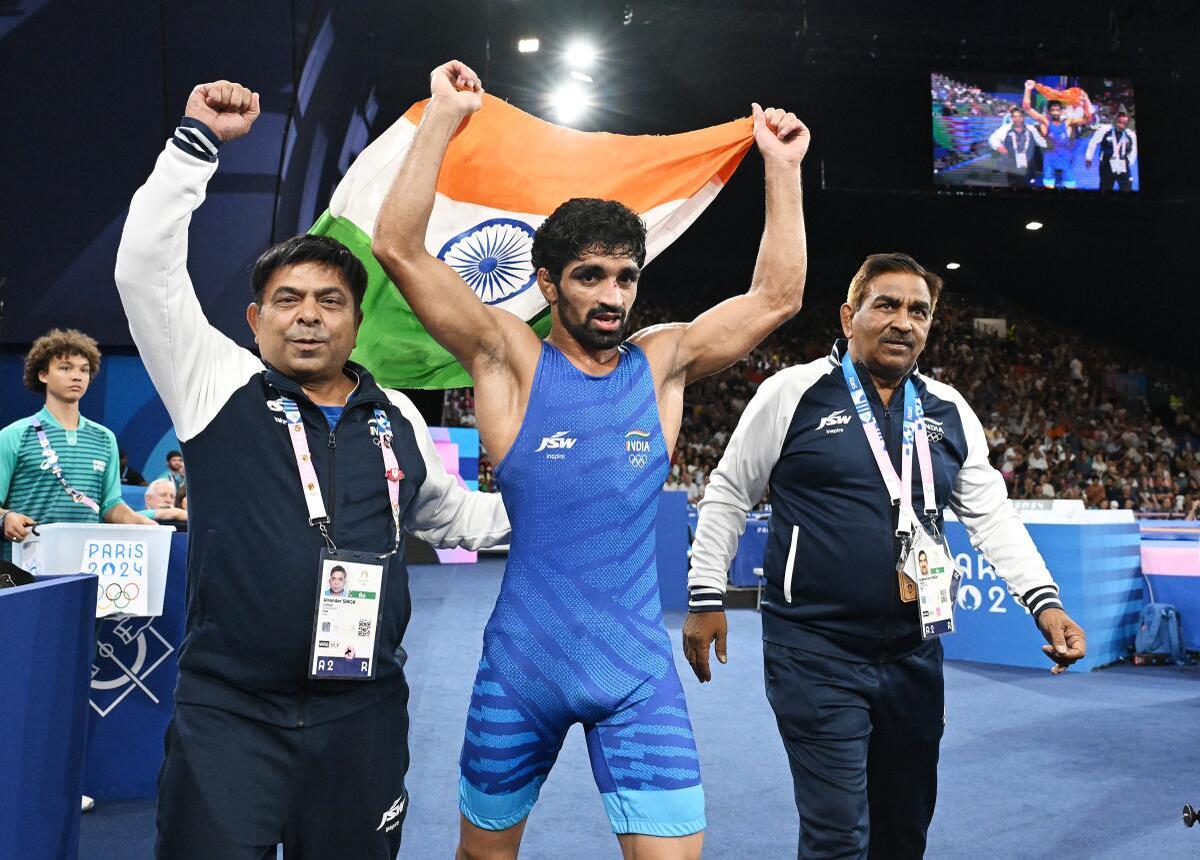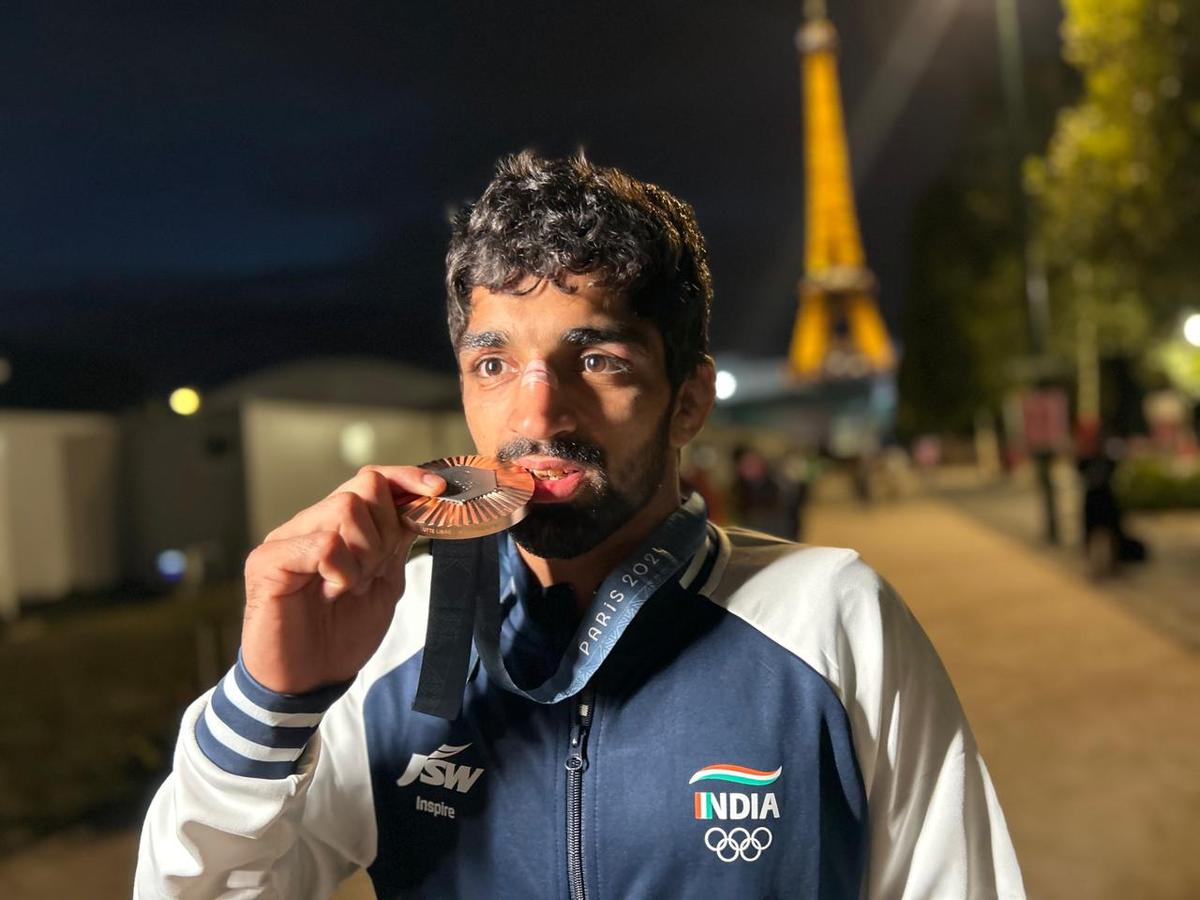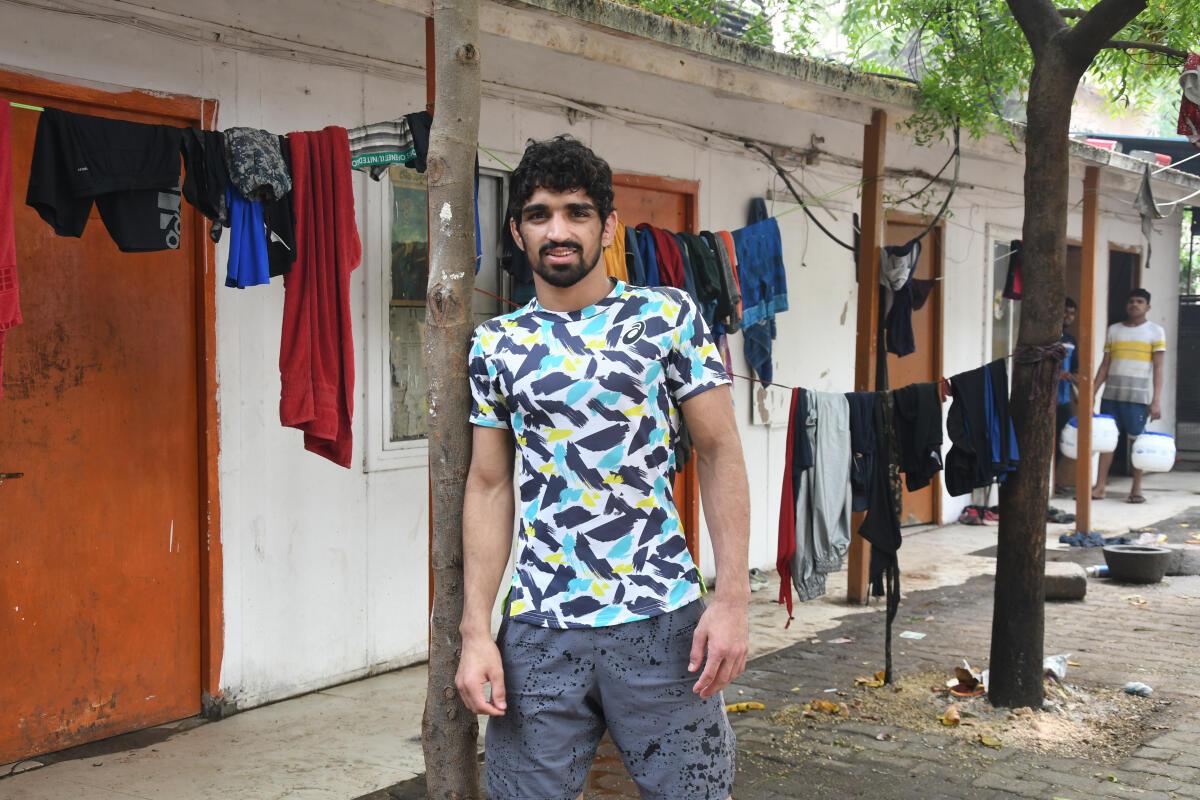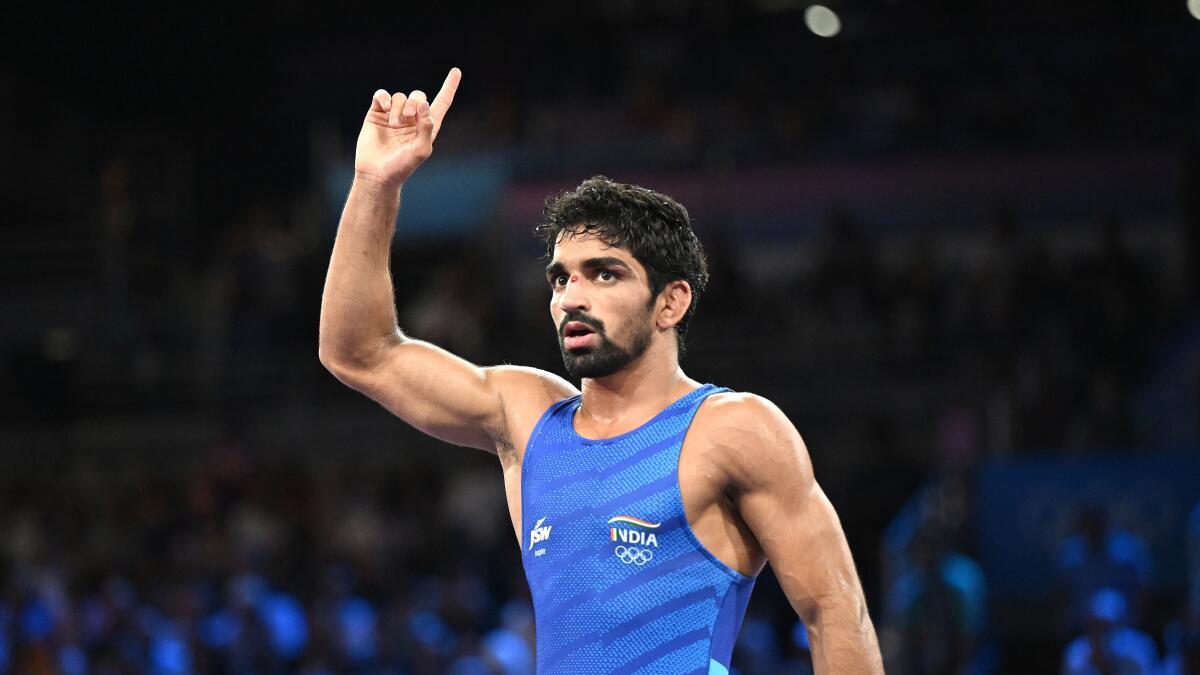Aman Sehrawat’s quest for Paris Olympics glory: How the wrestler lost 5kg before bronze medal bout weigh-in
Aman Sehrawat didn’t brood. On Thursday evening, up against former Olympic silver medallist Rei Higuchi in the semifinals, he barely lasted a round. The Japanese wrestler – a multiple time world medallist, quickly took down Aman, grabbed hold of his waist and turned him with ease. In no time, he trailed 0-10 and the bout was stopped – the Japanese declared winner by technical superiority.
It was always going to be a tough match-up. But Aman had reason to hope. He had beaten a former European champion and then a former world champion in his first couple of bouts. Had he somehow gotten the better of Higuchi, he would have reached the finals of the men’s 57kg category and therefore assured of a medal. Instead, he was ragdolled into submission.

Aman celebrates after winning bronze in the men’s freestyle 57kg match against Darian Toi Cruz of Puerto Rico in Champ-de-Mars Arena in Paris.
| Photo Credit:
RITU RAJ KONWAR/THE HINDU
Aman celebrates after winning bronze in the men’s freestyle 57kg match against Darian Toi Cruz of Puerto Rico in Champ-de-Mars Arena in Paris.
| Photo Credit:
RITU RAJ KONWAR/THE HINDU
There was no time to pity himself. The 21-year-old rushed out of the competition arena and began his weight control regime. He had 5 kilos to lose before his weigh in the next morning. By reaching the semifinal round, he had the right to wrestle for a bronze through repechage. But to earn the right to compete the next day, he needed to make weight.
ALSO READ | Who is Aman Sehrawat? The bronze medallist in wrestling from India at Paris 2024 Olympics
It can be harder to make weight that wrestle. The ‘cut’ had already taken a toll on the men’s 57kg category. On the first day of competition Iran’s Alireza Sarlak – a former world’s silver medallist and a medal contender failed to make weight and was scratched from the competition. Russian-turned-Albanian Zelimkhan Abakarov, a former world champion, barely managed to make weight. He struggled even to step on the mat. He had beaten Aman 10-0 the last time they met at the World Championships, but was drained of energy and lost by the same margin to the Indian in the quarterfinals in Paris.
However, what was probably an example that hit closest to home was when Aman’s own compatriot Vinesh Phogat had an assured medal snatched from her a few days ago after she was disqualified from the final of the women’s 50kg competition.
Aman wasn’t taking any chances.
He pulled on his black sweatsuit and headed to the mat in the training hall. He shadow-practised by himself for the next hour and a half. He then hit the gym and worked out some more. When he stood on the scales three hours later, he saw what he was looking for – 56.80. It took three sessions and three checks for Aman to rest easy.
Not a drop of water or a morsel of food was consumed. Hungry and thirsty, but mostly relieved, he went to bed.
Hours later, Aman felt a bit uneasy as he approached the scales. Thankfully, he was still under. At 7:30 am, he walked into the weigh-in room and made weight.

“It was hard but not anything more than what he can do. This is what we do,” coach Virender Singh said later about how much a part of the routine cutting weight is.
Only after passing his weigh-in would Aman finally allow himself to drink something. By the evening, he was ready to go.
That sucked for his opponent Darian Toi Cruz of Puerto Rico. A former collegiate champion in the USA, he has also represented the USA in international competitions before switching to his current team. He is good but the Indian had a hunger that will not be satiated by food.
He put up a challenge early on and even led 3-2 but Aman was relentless like a pitbull. He kept handfighting, snapping Cruz’s neck down and sapping his energy. As the fight wore on, the Indian’s pace took a toll. A close fight at 6-5 became a blowout as Aman racked up takedown after takedown. He won win 13-5.
By winning bronze, Aman Sehrawat joins an elite list of men’s Olympic wrestling medallists. It includes two-time Olympic medallist Sushil Kumar, 2012 bronze medallist Yogeshwar Dutt, Tokyo silver medallist Ravi Dahiya and Bajrang Punia who won bronze in that same edition.
All of them have emerged from an akhara that is to Indian wrestling what La Massia is to Spanish football.
There are no easy days at Chhatrasal Akhara in New Delhi’s Model town neighbourhood. It is an all-male boot camp. The boys live cramped five or more to a room. The electricity doesn’t always work. In the winter, you shiver. In the summer, you sweat. The place smells constantly of sweat. Chhatrasal teaches not just wrestling but pain tolerance, the willingness to undergo suffering for the promise of success. There’s no place for weakness or softness here. If you think you are special, you will be quickly cut to size. There’s always someone as hungry as you. Willing to do more than you. You do what you have to do or you go home.

Aman at home at the Chhatrasal Akhada
| Photo Credit:
V.V. Krishnan
Aman at home at the Chhatrasal Akhada
| Photo Credit:
V.V. Krishnan
Despite its reputation for hardness, every other day young boys come here on their own or are brought here from all over Haryana with dreams of being great wrestlers. If there is one place where dreams of becoming champion wrestlers are realised, it is at the Chhatrasal akhara.
But Chhatrasal isn’t just an academy for Aman. It’s also home. When he was 11 years old, he was brought to Chhatrasal by his uncle. He was a scrawny and shy boy then. Although he had wrestled at an akhara in the village of Birohar, in Haryana’s Jhajhar district, that wasn’t the only purpose for which he was brought here. He was brought in because he had nowhere else to go.
Aman doesn’t like to talk much about his early life. He has a painful past. When he was just 10, his mother died by suicide. His father, grief-stricken, died the same way a year later. His family isn’t rich. An uncle brought him to Chhatrasal soon after – if not to be a wrestler then at least so he could get three meals a day, helping out some of the more established players.
Many of the boys at Chhatrasal are homesick. That’s never been an option for Aman. Since he’s arrived at Chhatrasal, Aman’s life revolves around training and competition.
“He has almost no distractions. He has singular-minded focus on training,” says coach Praveen Kumar, one of the coaches at Chhatrasal Akhara.
“Chhatrasal Stadium is my home. The wrestlers here are my family. If someone comes and asks me to go somewhere for Diwali, I don’t agree. I make it clear I’m not leaving Chhatrasal. Now people also know that this is my mentality. I don’t like roaming around or going around Delhi either,” he says.
ALSO READ | Paris 2024 Olympics: Japanese wrestling juggernaut Fujinami ambles to freestyle gold
As the years passed in Chhatrasal, Aman slowly made a name for himself even in this school of champions. He made his way through the nationals, winning gold in 2022. He even started making a mark at the international level – becoming India’s first U-23 World Champion in 2022 and then winning an Asian Championship gold in 2023.
His exploits earned him the only real concession Chhatrasal provides its best athletes – a prefabricated room which he only has to share with two others. It has its own AC though. On one of the walls, Aman has put up a handpainted poster of the Olympic rings. Below it – in English– are the words, ‘If it was easy, everyone would do it’.
While he was dreaming of the Olympics, he had to get through his biggest challenge yet – fellow Chhattrasal trainee Ravi Dahiya, the Tokyo silver medallist. After two losses, Aman finally beat his senior rival at the Olympic selection trials in March this year.
Then came the Asian olympic qualifiers. But he missed out on the quota there, but there was no point of sulking. He dove into preparation for the World Olympic qualifiers and won the quota and thereafter the right to make it to Paris.
At the Olympics, Aman was placed in a tough group. However, he once again did what he knew he must on the mat and off it. By the time he got done, he had as a memento a raw cut on the bridge of his nose to go with the bronze medal around his neck.
The cut will heal, but the medal, Aman says, will not satisfy him.
Life will not change that much. He says he’ll go back to the same room he shares with two other athletes. He’ll continue to train as he’s always done. The only change is his dreams.
“I’m going to win a gold medal next time,” he says.



